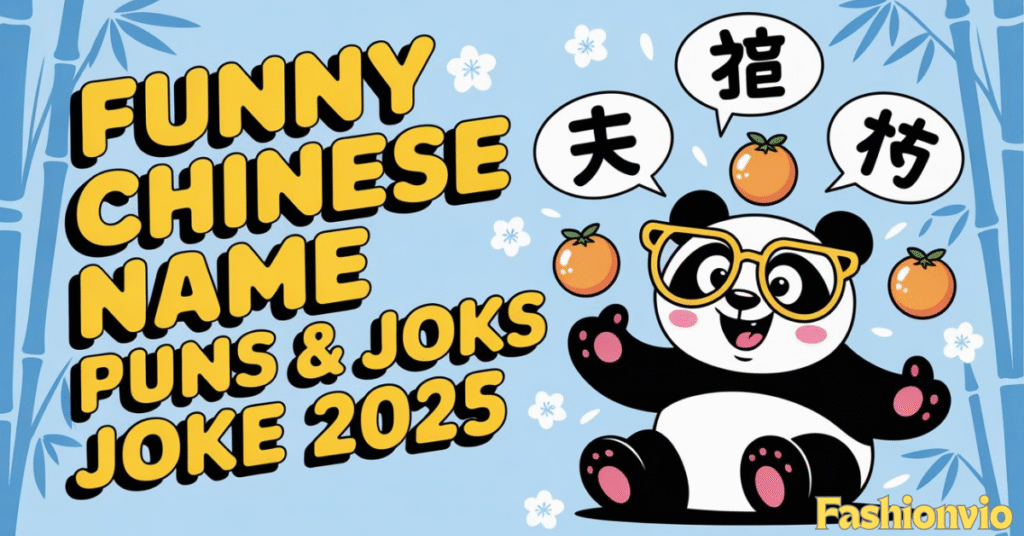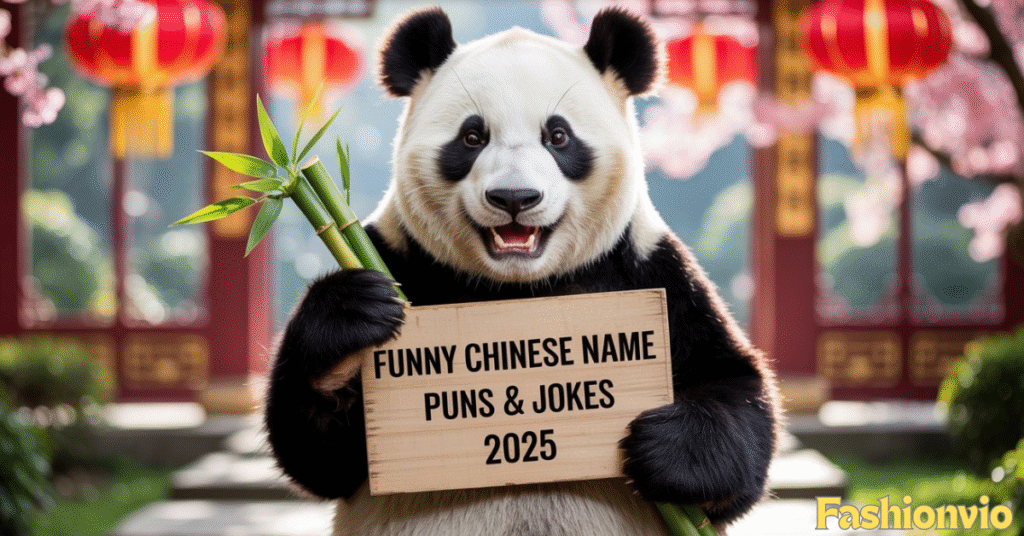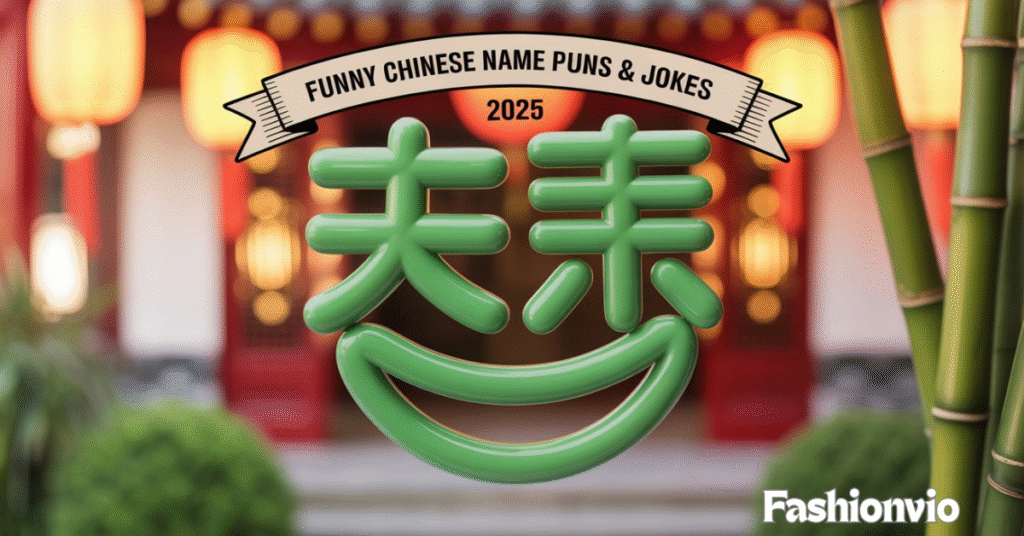Chinese name puns and jokes have become a comedy goldmine that bridges cultures through clever wordplay. These hilarious name combinations exploit the unique sound patterns of Mandarin pronunciation to create belly-laugh moments that work in both languages.
The magic happens when Chinese jokes one liners meet English phonetics. You’ll discover how tones and inflection create unexpected double meanings that’ll have you giggling for hours.
Classic Chinese Name Puns and Jokes
- Ho Lee Fook demonstrates how puns in English can emerge from authentic Chinese naming patterns without losing cultural respect.
- Ping Pong Lee combines sports references with traditional Chinese surnames for maximum comedic impact.
- Tai Ni Po works on multiple levels, showing how funny Chinese name puns and jokes can be both clever and family-friendly.
- Dum Gai represents the shorter, snappier style of Chinese name comedy that’s perfect for quick laughs.
- Hung Lo keeps things simple while delivering maximum comedic bang for your buck.
- No Wai captures that perfect moment of disbelief in just two syllables.
- Wei Tu Yung plays on age perceptions while maintaining that classic Chinese name structure.
- Hu Flung Pu brings bathroom humor into the mix with sophisticated wordplay.
- Long Wang demonstrates how traditional Chinese names can accidentally create English comedy.
- Ai Bang Mai Ni sounds like a romantic declaration while hiding cheeky implications.
- Won Hung Lo combines gambling references with anatomical humor in classic pun fashion.
- Tu Moch Info appeals to our information-overloaded modern world.
- Hu Yu Hai Ding creates mystery while delivering the punchline through pronunciation.
- Wai So Dum questions intelligence in the most polite Chinese way possible.
- Tu Gud Tu Bi Tru captures that feeling when something seems impossibly perfect.
- Lik Mai Sho brings footwear into the comedy equation with style.
- Bi Ching makes money references sound sophisticated through Chinese pronunciation.
- Kum Hia creates urgency through what sounds like a perfectly reasonable Chinese name puns and jokes.
- Sum Yung Gai plays on youth and chicken references simultaneously.
- Wun Dum Fuk delivers shock value while maintaining plausible Chinese pronunciation patterns.
Chinese Name Puns and Jokes in English Translation

- Ban Dit sounds like a respectable Chinese name until you realize it translates to “bandit” in English.
- Kai Oss appears innocent in Chinese but transforms into “chaos” when spoken in English.
- Mu Shu works as both a legitimate Chinese name puns and jokes a reference to the popular pork dish.
- Dim Sum functions perfectly as a Chinese name while referencing the beloved dining tradition.
- Chow Mein bridges the gap between personal names and popular noodle dishes.
- Lo Mein continues the food theme while sounding like a perfectly authentic Chinese surname.
- Bok Choy brings vegetables into the name game with sophisticated wordplay.
- Wok This Way transforms cooking implements into directional comedy.
- Tea Cup sounds elegant in Chinese while maintaining obvious English kitchen connections.
- Rice Bowl demonstrates how everyday objects become comedy through cross-cultural wordplay.
- Soy Sauce exemplifies condiment-based humor that works in both languages.
- Spring Roll combines seasonal references with popular appetizers.
- Fortune Cookie bridges Chinese-American culture with predictive humor.
- Kung Pao references the famous chicken dish while sounding like traditional Chinese naming.
- Sweet Sour captures the essence of popular Chinese-American flavors.
- Egg Drop transforms soup ingredients into personal identifiers.
- Hot Pot brings communal dining traditions into the naming convention.
- Steamed Bun elevates breakfast foods to name status with perfect pronunciation.
- Fish Ball demonstrates how street food becomes personal identity through wordplay.
- Bubble Tea captures modern Asian beverage trends in name form.
- Noodle Soup represents comfort food translated into personal identification.
- Fried Rice shows how simple dishes transform into complex name humor.
- Duck Sauce brings condiments back into the comedy rotation.
- Sesame Oil demonstrates how cooking ingredients become sophisticated name choices.
- Black Bean proves that simple ingredients create the most memorable name puns.
Spicy Chinese Name Humor
- Dirty Chinese name puns and jokes push boundaries while maintaining clever wordplay standards. These names sound innocent in Chinese but carry cheeky implications in English.
- Hugh Jass sounds perfectly respectable in Chinese pronunciation patterns while delivering obvious English humor.
- Mike Hunt demonstrates how Western names can work in reverse for Chinese-English comedy.
- Ben Dover shows cross-cultural name humor working in multiple directions.
- Phil McCracken proves that adult humor transcends language barriers.
- Anita Bath combines necessity with cleanliness in sophisticated wordplay.
- Barry McCockiner elevates playground humor to international comedy status.
- Drew Peacock brings barnyard animals into the sophisticated name game.
- Seymour Butts creates visual comedy through perfectly innocent Chinese pronunciation.
- Jack Mehoff demonstrates how common Western names become comedy gold.
- Ima Hogg shows how simple declarations transform into memorable names.
- Pat Mygroin combines common names with anatomical references.
- Mike Rotch proves that body part humor translates across cultures.
Hilarious Male Chinese Names

Funny male Chinese names often reference strength, wisdom, or traditional masculine virtues while creating unexpected English comedy.
- Wang Ker combines common Chinese surnames with English implications.
- Long Dong demonstrates how traditional Chinese names accidentally create English humor.
- Hung Wei shows masculine naming conventions transformed into comedy.
- Big Wang proves that size references work in any language.
- Fat Dong combines body references with traditional Chinese naming patterns.
- Tiny Wang creates ironic contrasts through name combinations.
- Strong Wang emphasizes masculine virtues while delivering English punchlines.
- Quick Wang brings speed references into the traditional naming structure.
- Smart Wang combines intelligence with comedy in perfect harmony.
- Lucky Wang demonstrates how fortune references become humorous through translation.
- Happy Wang shows emotional states transformed into personal identifiers.
- Brave Wang brings courage into the comedy equation.
- Wise Wang combines traditional values with modern humor.
- Fast Wang emphasizes speed while maintaining cultural naming patterns.
- Smooth Wang brings texture references into masculine naming conventions.
- Sharp Wang demonstrates how personality traits become comedy through wordplay.
- Cool Wang shows temperature references working in name-based humor.
- Hot Wang continues the temperature theme with opposite implications.
Filipino-Chinese Crossover Comedy
- Tagalog Chinese puns create triple-layer humor by incorporating Filipino language elements into Chinese name structures.
- Ay Nako combines Filipino exclamations with Chinese naming patterns for perfect cultural fusion.
- Kumusta Wang brings Filipino greetings into Chinese surname combinations.
- Salamat Po shows gratitude expressions transformed into personal names.
- Ang Ganda demonstrates how beauty references work across cultures.
- Sobrang Funny proves that intensity descriptors translate into memorable names.
- Talaga Lang brings Filipino certainty expressions into naming conventions.
- Grabe Naman shows surprise reactions becoming personal identifiers.
- Sige Na transforms encouragement into name-based comedy.
- Yun Lang demonstrates conclusion expressions working as personal names.
- Ganun Ba brings questioning patterns into the name game.
- Totoo Yan shows truth declarations transformed into personal identification.
- Syempre Naman proves that certainty expressions make excellent names.
- Pwede Na demonstrates acceptance becoming personal comedy.
- Okay Lang shows casual agreement transformed into naming patterns.
- Ewan Ko brings uncertainty expressions into personal identification.
- Baka Nga demonstrates possibility expressions working as names.
- Siguro Po shows polite uncertainty becoming personal identifiers.
- Malay Ko transforms knowledge disclaimers into name-based humor.
Reddit’s Favorite Chinese Name Collection

Reddit Chinese puns represent the internet’s collective comedy wisdom. These crowd-sourced gems have earned their place through upvotes and shares.
- Ho Lee Chit delivers maximum shock value while maintaining plausible pronunciation.
- Wi Tu Hi brings elevation humor into traditional naming structures.
- Sum Ting Fishy creates suspicion through perfectly innocent Chinese sounds.
- Tu Buku combines reading references with authentic Chinese pronunciation patterns.
- Wai U Cri transforms emotional expressions into personal identifiers.
- Hu Dat Guy brings identity questions into the naming convention.
- Wai So Serius references popular culture while maintaining Chinese name structure.
- Tu Kool Fo Skool shows educational references working in name-based comedy.
- Sum Won Kol Me creates communication humor through naming patterns.
- Wai Yu Laff transforms laughter into personal identification.
- Hu Wil Win brings competition into Chinese naming conventions.
- Tu Fast Tu Furious references action movies through name-based wordplay.
- Sum Ting Rong creates error detection through innocent pronunciation.
- Wai Yu So Gud shows compliments transformed into personal names.
- Hu Iz Boss brings workplace hierarchy into naming humor.
- Tu Hot Tu Handel demonstrates temperature comedy through naming patterns.
- Sum Won Tel Me creates information seeking through personal identification.
- Wai U No Tel transforms question patterns into memorable names.
- Hu Dat Iz brings identity confusion into naming conventions.
- Tu Funny Tu Bi Tru shows disbelief transformed into personal comedy.
- Sum Ting Gud demonstrates positive expressions working as names.
- Wai Yu Mad brings emotional states into personal identification.
- Hu Wil No creates knowledge questions through naming patterns.
- Tu Lat Fo Dat shows timing humor transformed into names.
- Sum Won Luv Me demonstrates affection seeking through personal identifiers.
Complete Alphabetical Chinese Name Treasury
List of funny Chinese names organized alphabetically helps you find exactly what you need for any comedy situation.
- Ai Bang combines love references with sound effects for double comedy.
- Ai Wil shows determination transformed into personal identification.
- Ban Ana brings fruit references into Chinese naming conventions.
- Bi Bi creates farewell humor through repetitive pronunciation patterns.
- Chi Ken transforms poultry into personal names with perfect pronunciation.
- Cho Ko brings chocolate references into traditional naming structures.
- Dai Wang combines size references with common Chinese surnames.
- Dum As shows intelligence humor through authentic pronunciation patterns.
- Fat Sum demonstrates size references working in naming conventions.
- Gud Bai transforms farewells into memorable personal identifiers.
- Hai Yu brings greeting patterns into Chinese naming traditions.
- Hap Pi shows emotional states becoming personal names through wordplay.
- Kam Hia creates urgency through perfectly reasonable Chinese pronunciation.
- Laf Out Loud brings internet expressions into traditional naming patterns.
- Mai Tai combines cocktail references with authentic Chinese naming.
- No Wei demonstrates disbelief transformed into personal identification.
- Pal Mi shows friendship references working as personal names.
- Qui Et brings noise level humor into naming conventions.
- Rum Mi transforms card games into personal identifiers.
- Slo Mo demonstrates speed humor through traditional naming patterns.
- Tel Mi creates information seeking through personal identification.
- Up Set shows emotional states transformed into naming conventions.
- Veri Gud demonstrates approval expressions working as personal names.
- Wok Dis Wei brings cooking implements into directional comedy.
- Yu No creates knowledge patterns through personal identification.
- Zee End shows conclusion expressions transformed into memorable names.
Lightning-Fast One-Liners

Chinese one-liner jokes deliver instant gratification through rapid-fire wordplay. These one-liner jokes work perfectly for social media, text messages, or quick conversation starters.
- Why did Wang go to therapy? He had too many hang-ups about his name pronunciation.
- Sum Ting Wong walked into a bar and ordered everything right.
- Wei Yu So Funny asked his friend why everyone kept laughing at introductions.
- Hu Dat Guy never gets invited to parties because nobody knows his name.
- Ai Wil Win declared victory before the game even started.
- Tu Moch Coffee explained why he couldn’t sleep last night.
- Wai So Serius couldn’t understand why people smiled when meeting him.
- Ho Lee Cow works at the dairy farm and loves the irony.
- Sum Won Luv Me started a dating app specifically for Chinese name pun enthusiasts.
- Hu Wil No became the neighborhood gossip expert through pure name destiny.
- Tu Fast Tu C couldn’t understand why people always asked him to slow down.
- Wai Yu Cri turns every movie into an emotional experience.
- Sum Ting Rong works as a quality control inspector and embraces the career choice.
- Hu Iz Dis introduces himself twenty times at every party.
- Ai Cum Kwik specializes in express delivery services.
- Tu Slo Tu Gro became a gardening expert through name-based destiny.
- Wai So Smal shops exclusively in the petite section.
- Ho Lee Shet expresses surprise in both languages simultaneously.
- Sum Ting Fishy works as a seafood inspector and loves the coincidence.
- Hu Dat Bi works in human resources and enjoys the name recognition.
Understanding Chinese Nicknames and Terms
Cute Chinese nicknames add another layer to Chinese name humor. 小宝贝 (Xiǎo bǎobèi) means “little treasure,” while 小猫 (Xiǎo māo) translates to “little cat.” These endearing terms show how Xiao in Chinese names creates affectionate diminutives.
小猪 (Xiǎo zhū) means “little pig” and represents cute rather than insulting terminology. 小兔子 (Xiǎo tùzi) translates to “little rabbit,” showing how animal references create affection in Chinese culture.
乖乖 (Guāiguāi) means “good girl/boy” and demonstrates how repetitive sounds create endearment. These nicknames in Chinese culture carry emotional weight that pure translations miss.
Clever in Chinese translates as 聪明 (Cōng míng), combining intelligence with brightness. This demonstrates how Chinese concepts often merge multiple positive qualities into single expressions.
The Chinese word for love is 爱 (Ài), which appears in many romantic name puns. Understanding this character helps create more sophisticated language humor.
Frequently Asked Questions
What makes Chinese names naturally funny in English?
The monosyllabic charm of Chinese creates perfect comedy setups. Each syllable carries complete meaning in Chinese, but when combined and pronounced in English, they often form hilarious phrases or expressions.
Are these puns culturally appropriate?
Chinese name puns celebrate linguistic creativity rather than mocking culture. They highlight the fascinating differences between languages while creating harmless wordplay that brings people together through laughter.
How do you pronounce these correctly?
Mandarin pronunciation follows specific tones and inflection patterns. However, for comedy purposes, English pronunciation creates the humor. The names work precisely because they sound different in each language.
Where can I use these jokes?
Funny Chinese names work best in casual social settings, social media posts, or among friends who appreciate wordplay humor. Avoid using dirty Chinese name puns in professional or formal situations.
What’s the difference between Mandarin and Cantonese pronunciation?
Mandarin uses four main tones while Cantonese employs six to nine tones depending on the dialect. For Chinese jokes one liners, Mandarin pronunciation patterns work best because they’re more widely recognized internationally.
Sharing These Puns Responsibly
Comedy characters like these work best when everyone’s in on the joke. Chinese puns 2025 should bring people together through shared laughter, not create divisions or discomfort.
Consider your audience before sharing adult humor versions. What’s hilarious among close friends might not work in mixed company or professional settings.
Reddit Chinese puns prove that online communities love this humor when it’s shared respectfully. The key lies in celebrating linguistic creativity rather than perpetuating stereotypes.
Use these one-liner jokes to break ice, lighten moods, or add humor to social media posts. They work brilliantly as conversation starters when used thoughtfully.
The Universal Language of Laughter
Language humor transcends boundaries by celebrating the quirks that make each language unique. These Chinese name puns demonstrate how linguistic differences create opportunities for connection rather than division.
The best funny Chinese names work because they’re genuinely clever. They require understanding of both languages to fully appreciate the wordplay, making them intellectual comedy that rewards cultural knowledge.
Cross-cultural wordplay like this proves that humor can bridge any gap. When people laugh together at linguistic coincidences, they’re celebrating the beautiful complexity of human communication.
These Chinese puns in English will keep evolving as languages continue influencing each other. The 2025 collection represents just the beginning of this ongoing comedy tradition that brings people together through shared laughter and linguistic appreciation.


